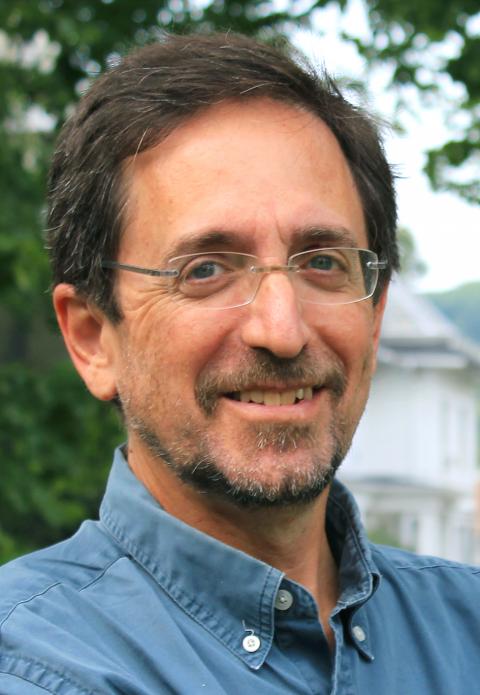When New York Times climate blogger Andrew C. Revkin was invited by a local foundation to give a lecture about the ongoing destruction of the Amazon rain forest, he didn’t know that Sting would be giving a concert at the Taipei Arena later the same day. But when a local reporter told him about the Sting show, Revkin said that if his schedule permits, he will try to make it and perhaps try to say hello to Sting backstage later.
Revkin will give a lecture, The Invisible Ax: Global Corporations Slaughter the Amazon, tomorrow as part of the Lung Yingtai Cultural Foundation’s (龍應台文化基金會) MediaTek Taipei Salon (台北沙龍) series. Kurtis Pei (裴家騏), a professor at the Institute of Wildlife Conservation, National Pingtung University of Science and Technology, will moderate the lecture. Revkin, who has written extensively on sustainability issues and climate change, will discuss the global impact of rainforest destruction.
It turns out that Revkin was once on the board of Rainforest Foundation which Sting helped create in the late 1980s, and the two men know each other.

Photo courtesy of the Lung Yingtai Cultural Foundation
The Rainforest Foundation was founded in 1989 by Sting and his wife Trudie Styler after they saw first-hand the destruction of the Amazon rainforest, and the devastating impact it had on the lives of the indigenous peoples who lived there. It now operates in more than 20 countries.
While Revkin carved out a career as a globe-trotting science reporter for Discover magazine and the New York Times, he is also an amateur musician and songwriter. He plays a mean folk guitar and has been known to back up folksinger Pete Seeger at shows in the New York area. In addition, he is a member of Uncle Wade, a blues-roots band.
Revkin has written movingly about the destruction of the Amazon rain forest, as well as the 2004 Asian tsunami that hit Thailand and Indonesia. He has also visited Greenland to see first-hand the melting glaciers there.
As a singer/songwriter himself, Revkin admires Sting and would love to take in his Taipei show if time allows, he said in an e-mail from New York before flying to Taiwan.
Two films have been based on Revkin’s work, with one about the Amazon rain forest and other about a rock tribute band.
The Burning Season was an HBO film based on a biography of Chico Mendes, the iconic, slain defender of the Amazon rain forest. The second movie, Rock Star, was based on a 1997 newspaper article titled “A Metal-Head Becomes a Metal-God. Heavy,” in which Revkin described how a singer in a Judas Priest tribute band rose to replace his idol in the real band.
Taipei Salon (台北沙龍), The Invisible Ax: Global Corporations Slaughter the Amazon, tomorrow from 2pm to 4pm. The lecture takes place at Yue-han Hall (月涵堂), 110 Jinhua St, Taipei City (台北市金華街110號) and will be conducted in English with simultaneous interpretation in Mandarin. Admission is free, but those attending must register online at www.civictaipei.org or by calling (02) 3322-4907.

May 26 to June 1 When the Qing Dynasty first took control over many parts of Taiwan in 1684, it roughly continued the Kingdom of Tungning’s administrative borders (see below), setting up one prefecture and three counties. The actual area of control covered today’s Chiayi, Tainan and Kaohsiung. The administrative center was in Taiwan Prefecture, in today’s Tainan. But as Han settlement expanded and due to rebellions and other international incidents, the administrative units became more complex. By the time Taiwan became a province of the Qing in 1887, there were three prefectures, eleven counties, three subprefectures and one directly-administered prefecture, with

It’s an enormous dome of colorful glass, something between the Sistine Chapel and a Marc Chagall fresco. And yet, it’s just a subway station. Formosa Boulevard is the heart of Kaohsiung’s mass transit system. In metro terms, it’s modest: the only transfer station in a network with just two lines. But it’s a landmark nonetheless: a civic space that serves as much more than a point of transit. On a hot Sunday, the corridors and vast halls are filled with a market selling everything from second-hand clothes to toys and house decorations. It’s just one of the many events the station hosts,

Among Thailand’s Chinese Nationalist Party (KMT) villages, a certain rivalry exists between Arunothai, the largest of these villages, and Mae Salong, which is currently the most prosperous. Historically, the rivalry stems from a split in KMT military factions in the early 1960s, which divided command and opium territories after Chiang Kai-shek (蔣介石) cut off open support in 1961 due to international pressure (see part two, “The KMT opium lords of the Golden Triangle,” on May 20). But today this rivalry manifests as a different kind of split, with Arunothai leading a pro-China faction and Mae Salong staunchly aligned to Taiwan.

Two moves show Taichung Mayor Lu Shiow-yen (盧秀燕) is gunning for Chinese Nationalist Party (KMT) party chair and the 2028 presidential election. Technically, these are not yet “officially” official, but by the rules of Taiwan politics, she is now on the dance floor. Earlier this month Lu confirmed in an interview in Japan’s Nikkei that she was considering running for KMT chair. This is not new news, but according to reports from her camp she previously was still considering the case for and against running. By choosing a respected, international news outlet, she declared it to the world. While the outside world